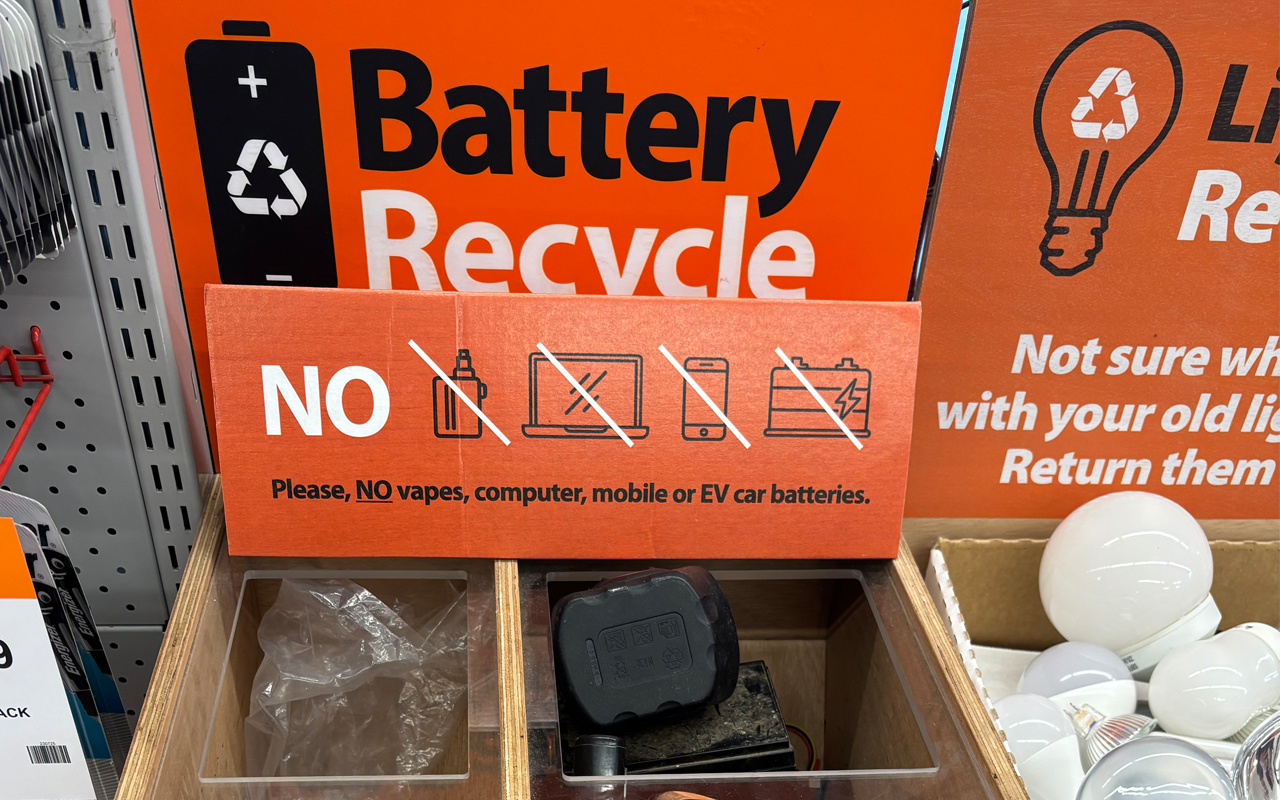Southland's fiery problem of e-battery disposal
27 July 2025, 4:15 AM
 Mitre 10 stores have recycled almost 30 tonnes of household batteries since the programme's launch in 2023, however they only accept batteries they have sold and will also not accept damaged, modified, vape or e-waste batteries. Photo: Southland App
Mitre 10 stores have recycled almost 30 tonnes of household batteries since the programme's launch in 2023, however they only accept batteries they have sold and will also not accept damaged, modified, vape or e-waste batteries. Photo: Southland AppOptions for the public to dispose of their damaged lithium batteries continues to be a challenge in Southland with both nationwide recycler Pheonix Metalman - who have an Invercargill depot, and Mitre 10 - who offer a collection service for batteries they have sold, currently refusing to accept the potentially dangerous batteries.
The Pheonix Metalman website says that they recycle over 20 subtypes of domestic, commercial and industrial batteries, however they currently cannot accept damaged lithium batteries.
We understand that this is a growing concern. Advice will be published soon regarding how to handle and dispose of them, their website says. Southland App was unable to reach Pheonix Metalman for further comment.
Mitre 10 New Zealand Chief Legal & Sustainability Officer, Grant Fraser, said they accepted batteries sold through their stores and had currently recycled 29.6 tonnes.
"For us it’s about taking ownership and end-of-life responsibility for the products we put into market."
'We’re not able to accept damaged or modified batteries due to the fire risk, nor vape batteries, e-waste (i.e computer/phone batteries), EV batteries, and solar batteries as they’re not part of our range," he said.
Mitre 10 New Zealand's Head of External Comms, Lisa Wilson, also confirmed that only batteries that came from their stores be returned through their Battery Recycle programme.
WasteNet Southland director Fiona Walker said previous communication with Mitre 10 had not specified their collection and diversion service only related to batteries sold through Mitre 10 stores.
"We will engage with Mitre 10 directly to clarify this."
"We understood the safe disposal of damaged batteries, in particular, was a growing concern," she said.
"Our supplier, Phoenix Metalman, can accept some damaged batteries, however customers should contact them directly prior to disposal for advice on how to do so safely," she said.
"We understand that for those who do not live in Invercargill, Winton, Gore or Te Anau that there are some concerns regarding transporting end-of-life batteries," Walker said.
"If the batteries are not damaged, transporting them to a collection site can be done safely provided specific measures are followed, including ensuring these are taped or individually bagged prior to storing, and that they are not stored with flammable or conductive materials such as metal, paper clips, or staples."
"If you are unsure, please contact your preferred e-battery waste disposal location for further advice."
A Fire and Emergency spokesperson offered the following recommendations around safe battery disposal.
Always dispose of lithium-ion batteries safely.
Do not put lithium-ion batteries in the rubbish or recycling. Batteries need to be taken to either a collection point or transfer station – contact your local council for a recycling location.
WasteMINZ has a map on their website which shows battery collection facility locations: https://www.wasteminz.org.nz/our-work/hot-topics/battery-collection-facilities.
Do not leave discarded batteries in piles.
Some companies do battery collection for vapes and other small batteries, so it’s important not to throw them into the general household collection. They need to be treated like other lithium-ion battery devices, and disposed of through an appropriate recycling facility.
If a device or battery starts to smoke or emit flames:
- Evacuate immediately and close doors (if safe) to slow the spread of fire.
- Once in a safe location, call 111 and wait for firefighters to arrive.
- Ensure no one goes back inside the building for any reason. Battery gases, vapour and smoke are highly toxic and flammable and must not be inhaled.
- If anyone has been exposed to battery fluids, debris, smoke, vapours, or flames, seek urgent medical assistance.
If a small battery or device such as a vape or phone starts overheating
- Unplug it from the power outlet if it is charging.
- If possible, move it outside, away from any flammable material and windows or doorways.
- Small devices can be dropped into a bucket of water if this can be done safely.
- If your device starts to smoke or release fumes, evacuate immediately to a safe location and call 111.